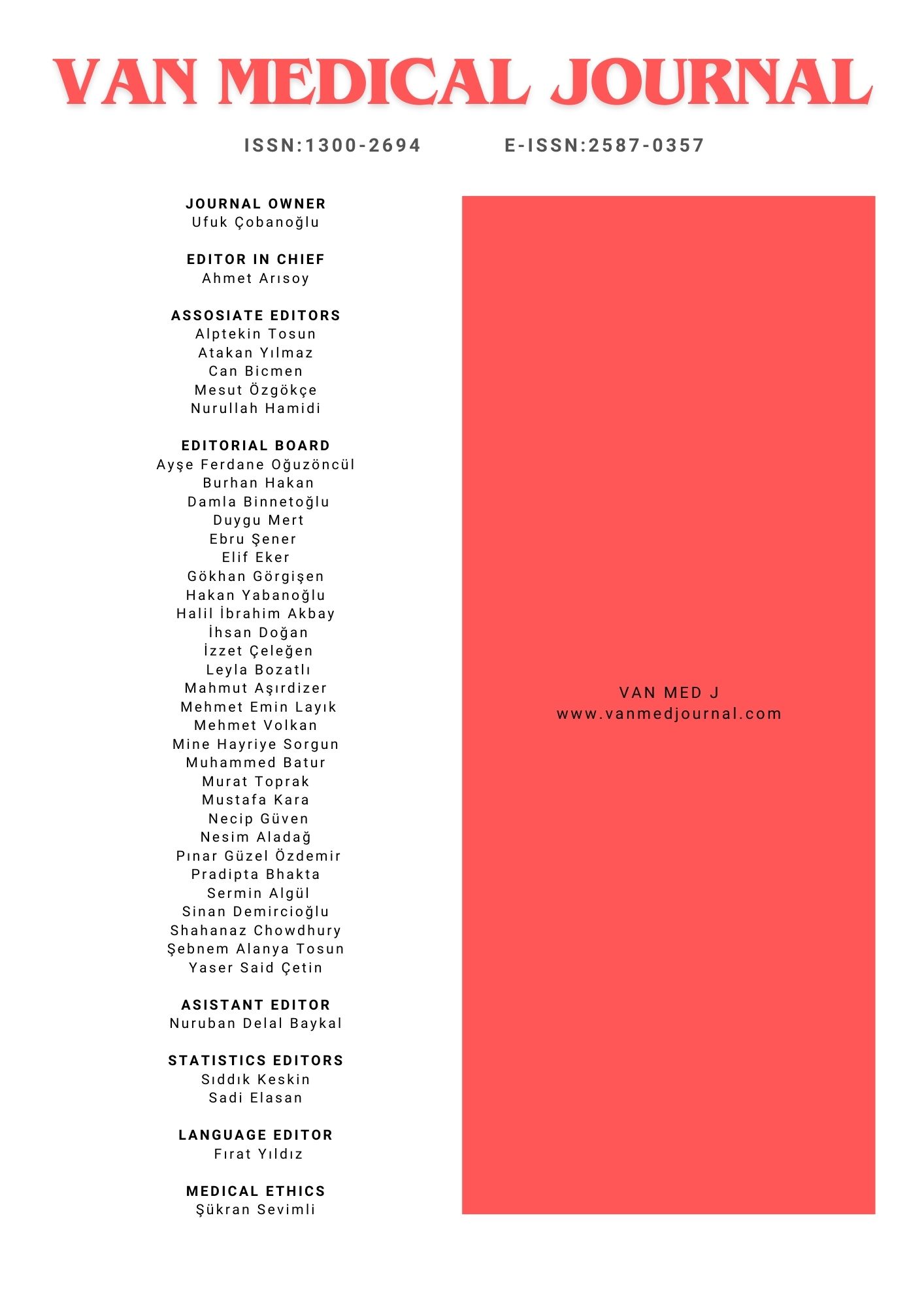The Impact of Anesthesia Method on Postoperative Cognitive Functions in Urological Surgeries: A Prospective Randomized Single-Blind Study
Nurettin KurtDepartment of Anesthesiology and Reanimation, Van Yuzuncu Yil University Faculty of Medicine, Van/TurkeyINTRODUCTION: Postoperative cognitive dysfunction contributes to cognitive impairments following surgeries.Despite the potential of anesthesia methods causing cognitive dysfunction,conclusive evidence remains elusive.This study aims to compare the effects of general and spinal anesthesia on postoperative cognitive functions in patients undergoing urological surgeries.
METHODS: 108 patients aged 18 to 75 years, who underwent elective surgeries,were included in this study.Regardless of the anesthesia method chosen for surgery, the Mini-Mental State Test (MMST) was administered by a clinician at 24 hours preoperatively to assess cognitive functions in a blinded manner. At postoperative 24 hours, the same independent clinician repeated the MMST assessment. Preoperative and postoperative MMST scores were recorded. Patients were categorized into two groups: Group G received general anesthesia,and Group S underwent spinal anesthesia.Demographic data,surgery durations,and MMST values of the included cases were compared between the groups.
RESULTS: Of the 108 included patients, 80 were male (74.1%) and 28 were female (25.9%). Forty-eight patients received general anesthesia (Group G), while 60 patients received spinal anesthesia (Group S).No significant differences were observed between the groups in terms of age,ASA classification,and comorbidities.The female-to-male ratio was statistically significantly higher in Group G,while the male-to-female ratio was higher in Group S (p=0.014). The average surgery duration in Group G (87.56±28.15 minutes) was significantly longer than that in Group S (61±18.91 minutes) (p=0.001).When comparing preoperative and postoperative 24-hour MMST scores in both groups,no statistically significant differences were observed.
DISCUSSION AND CONCLUSION: No significant differences were found in terms of postoperative cognitive dysfunction between the general and spinal anesthesia methods used in patients undergoing urological surgeries
Ürolojik Cerrahilerde Anestezi Yönteminin Postoperatif Kognitif Fonksiyonlar Üzerine Etkisi: Prospektif Randomize Tek-Kör Çalışma
Nurettin KurtVan Yüzüncü Yıl Üniversitesi Tıp Fakültesi, Anesteziyoloji ve Reanimasyon Anabilim Dalı, Van/TürkiyeGİRİŞ ve AMAÇ: Postoperatif kognitif disfonksiyon ameliyatlardan sonra bilişsel bozukluklara neden olmaktadır. Anestezi yönteminin kognitif disfonksiyona neden olabileceği belirtilmesine karşın hala yeterli kanıtlara ulaşılamamıştır. Bu çalışmada, ürolojik cerrahi uygulanan hastalarda genel ve spinal anestezinin postoperatif kognitif fonksiyonlar üzerine etkilerinin karşılaştırılması amaçlandı.
YÖNTEM ve GEREÇLER: Çalışma elektif şartlarda ameliyatı yapılan ve ASA I-II-III (American Society of Anaesthesiology) risk grubu, 18-75 yaş arası 108 hasta üzerinde yapıldı. Hastalara operasyon için tercih edilecek anestezi yönteminden bağımsız, kör bir klinisyen tarafından preoperatif 24. saatte kognitif foksiyonları değerlendirmek amacıyla Mini Mental Test (MMT) uygulandı. Hastalara postoperatif 24. saatte ilgili serviste aynı bağımsız klinisyen tarafından MMT tekrarlandı. Preoperatif ve postoperatif ölçülen MMT puanları kaydedildi. Hastalar iki gruba ayrıldı. Genel anestezi verilenler Grup G, spinal anestezi uygulananlar Grup S olarak isimlendirildi. Çalışmaya dahil edilen vakaların demografik verileri, ameliyat süreleri ve MMT değerleri gruplara göre karşılaştırıldı.
BULGULAR: Çalışmaya dahil edilen 108 olgunun 80’i erkek (%74.1), 28’i kadın (%25.9) cinsiyetteydi. Kırk sekiz hastaya genel anestezi (Grup G), 60 hastaya ise spinal anestezi (Grup S) uygulandı. Gruplar arasında yaş, ASA ve komorbiditeler açısından anlamlı bir fark saptanmadı. Grup G’de kadın cinsiyet, Grup S’de ise erken cinsiyet oranı istatistiksel olarak anlamlı düzeyde daha yüksekti (p=0.014). Grup G’de ortalama ameliyat süresi (87.56 ± 28.15 dk) Grup S’ye (61 ± 18.91) göre anlamlı derecede uzundu (p=0.001). Her iki gruptaki tüm hastaların preoperatif ve postoperatif 24. saatte ölçülen MMT skorları karşılaştırıldığında istatistiksel olarak anlamlı fark saptanmadı.
TARTIŞMA ve SONUÇ: Ürolojik cerrahi geçiren hastalarda kullanılan genel ve spinal anestezi yöntemleri arasında postoperatif kognitif disfonksiyonlar açısından anlamlı fark saptanmadı.
Corresponding Author: Nurettin Kurt, Türkiye
Manuscript Language: Turkish

